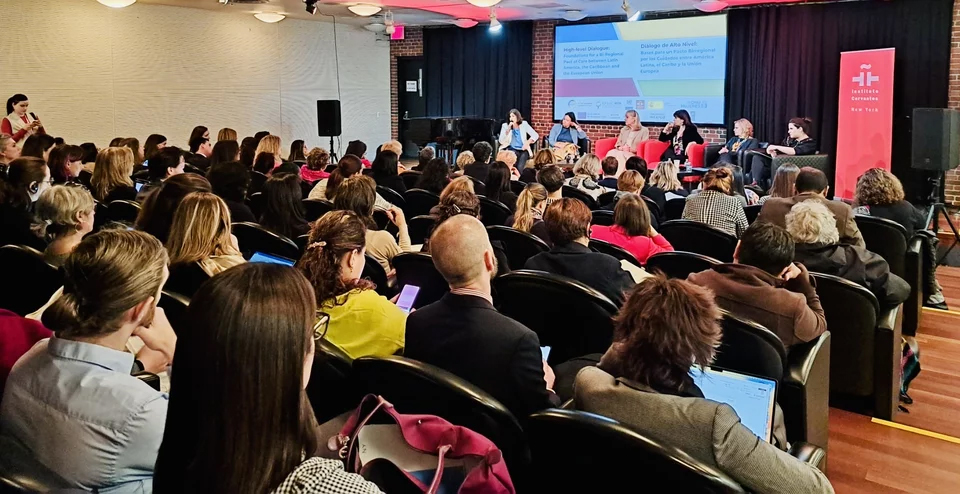Advances Towards a Bi-Regional Pact on Care: Latin America, the Caribbean, and the European Union Join Forces
Work area(s)

Representatives from governments, international organizations, and civil society discussed the foundations for a Bi-Regional Pact on Care between Latin America, the Caribbean, and the European Union. The initiative aims to foster cooperation in public policy and comprehensive care systems through the exchange of advancements and promising practices in care policies, systems, programs, and services; comparative studies and analyses on care-related topics; subregional, regional, and multilateral cooperation programs through North-South, South-South, triangular, and circular cooperation modalities; and by formulating concrete proposals to be considered by decision-makers and authorities to advance towards a care society.
The meeting was organized by the EU-LAC Foundation, UN Women, and the Economic Commission for Latin America and the Caribbean (ECLAC), in partnership with the Global Alliance for Care, the National Women's Institute of Mexico (INMUJERES), the United Nations Development Program (UNDP), and the Spanish Ministry of Equality, and took place in New York during the 68th session of the Commission on the Status of Women.
In the event's opening, the Spanish Minister of Equality, Ana Redondo, emphasized the need to “strengthen alliances with countries interested in advancing the care agenda, particularly so women do not have to sacrifice their careers for care obligations”. She also highlighted that the journey is arduous because dismantling patriarchy is extremely challenging. She proposed a roadmap to realize the care agenda, involving a common methodology of shared contexts and challenges, promoting the exchange of best practices, and creating a repository of proven ideas and projects.
Leire Pajín, President of the EU-LAC Foundation, stated: "It is important for us to provide a space for dialogue, to discuss ideas, and to hear your proposals on how to support the process of promoting the Pact. We aim to secure greater commitment to its implementation, especially with the upcoming CELAC-EU Summit in Colombia in 2025 and the Regional Conference on Women in Latin America and the Caribbean in Mexico".
The European External Action Service's Gender and Diversity Ambassador, Stella Ronner-Grubačić, stated that gender equality is essential for the development of all and noted that the Latin American and Caribbean countries are strategic partners with whom the EU shares historical commitments like gender equality promotion. She emphasized the importance of advancing the care agenda, particularly in challenging times of cascading crises.
The President of INMUJERES, Nadine Gasman Zylbermann, reflected on the long path traveled by feminism, noting how care discussions in multilateral spaces were unimaginable ten years ago. She stressed the need to recognize care work, predominantly done by women, as a crucial element for societal well-being and a common good. She also emphasized the importance of finding points of convergence between regions to learn from each other and called for continued collaboration with the Global Alliance for Care.
When presenting the proposal for the Bi-regional Pact for Care, the Regional Director of UN Women for Latin America and the Caribbean, María Noel Vaeza, underscored that "This Pact represents a significant opportunity to strengthen strategic cooperation between both regions towards egalitarian and supportive societies, from a feminist, intersectional, transformative, and innovative approach, thus advancing towards the care society as a horizon and path for a transformative, sustainable, and equal recovery, placing at its core the feminist principle of sustainability of life".
Lucía Scuro, Senior Officer of Social Affairs, on behalf of Ana Güezmes, Director of the Division for Gender Affairs, ECLAC, added that "this initiative is pioneering in promoting dialogue and cooperation between both regions to overcome the gender division of labor expressed in the persistence of gaps between men and women in the labor market and in wages, in women's access to quality employment, and to social protection and security. This bi-regional pact, which places sustainability of life and the planet at its core, contributes to a renewed multilateral international system, with rules that reduce asymmetries and imbalances between and within countries, thus advancing towards a more productive, inclusive, and sustainable future."
High-level dialogues included interventions from ministers of Belize, Chile, Colombia, Costa Rica, Grenada, Guatemala, Honduras, and Panama, as well as European Commission and Spanish authorities. Government representatives expressed support for the Bi-Regional Pact on Care and emphasized the importance of united efforts to advance the initiative. Representatives from the European Institute for Gender Equality (EIGE), the International Labour Organization (ILO), the Simone de Beauvoir Leadership Institute (ILSB), Oxfam Intermón, and the International Federation of Domestic Workers also participated.
In closing, Ana Moreno, Technical Secretary of the Global Alliance for Care, underscored that while significant progress has been made in care by EU and Latin American and Caribbean countries, more work is needed. She proposed adding two more "Rs" to the existing five (recognize, reduce, redistribute, reward, and represent care): resources and resilience.
Leire Pajín, President of the EU-LAC Foundation, concluded the dialogue by urging authorities and representatives of countries to consolidate their efforts in fostering collaboration and cooperation between both regions in the realm of care through the Pact initiative.
Type
Country(ies)
- European Union
- Latin America and the Caribbean
Related link(s)
Contact
Public Information Unit
- prensa@cepal.org
- (56 2) 2210 2040
